句子成分和简单句的五种基本句型复习课件
文档属性
| 名称 | 句子成分和简单句的五种基本句型复习课件 |  | |
| 格式 | zip | ||
| 文件大小 | 689.8KB | ||
| 资源类型 | 教案 | ||
| 版本资源 | 牛津上海版(全国版) | ||
| 科目 | 英语 | ||
| 更新时间 | 2015-05-08 18:29:17 | ||
图片预览

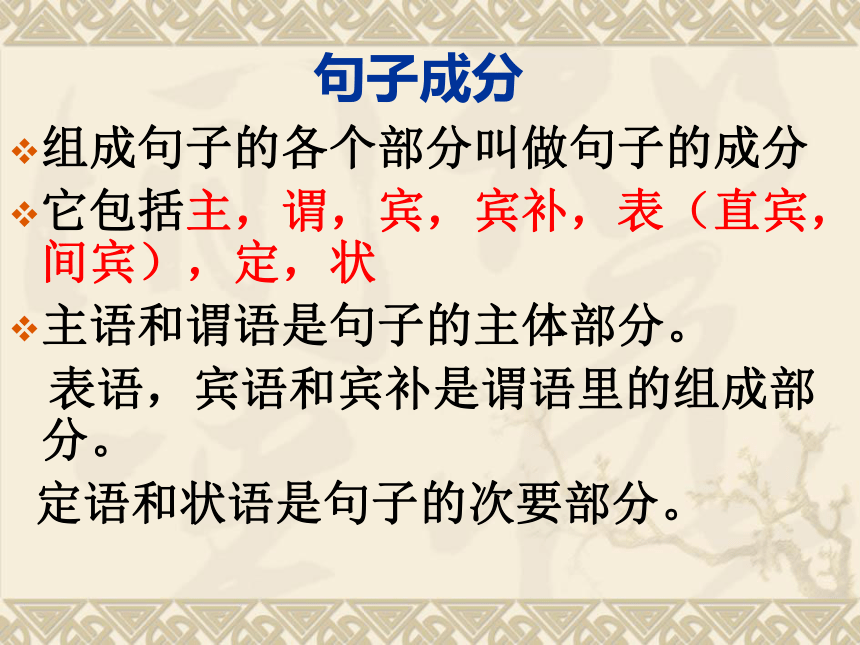
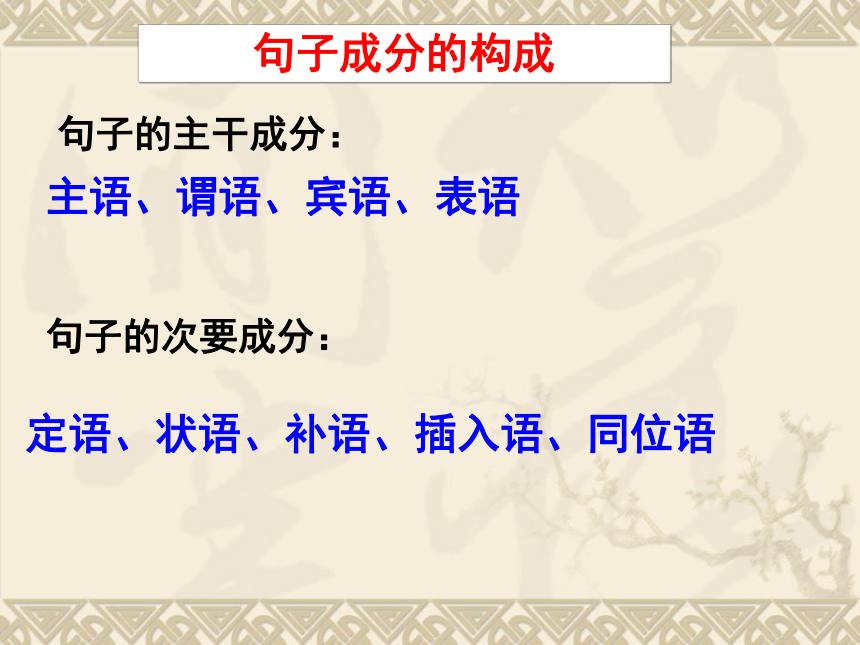
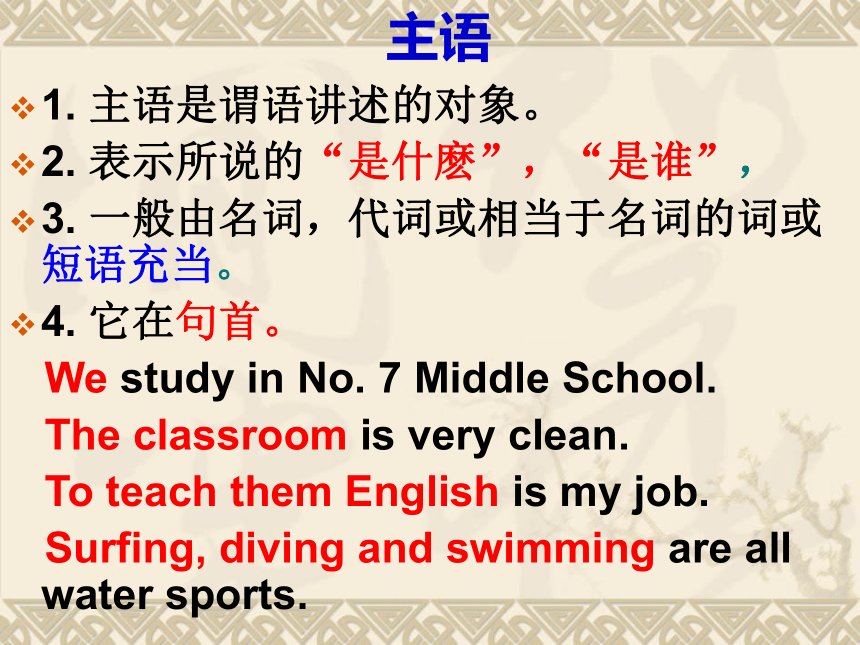
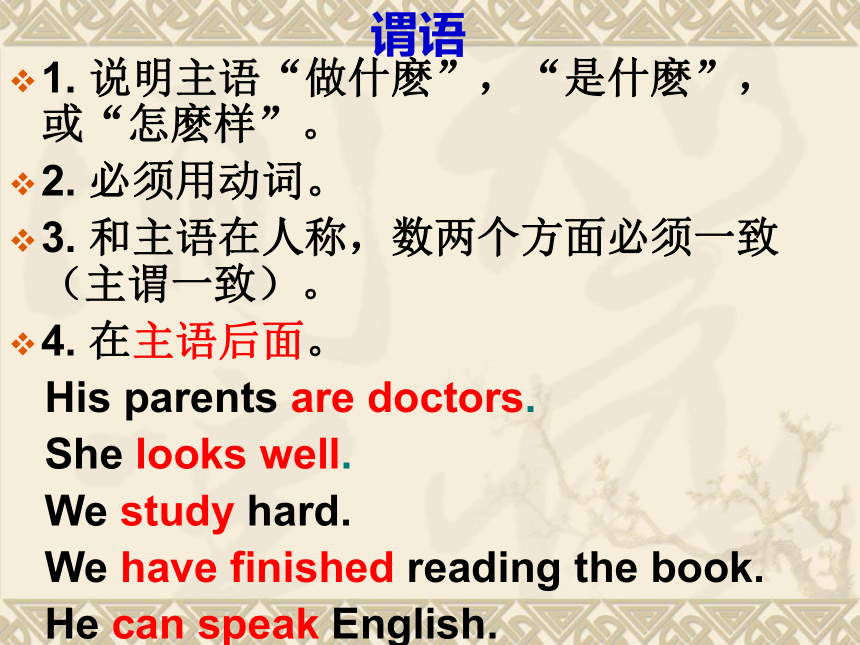
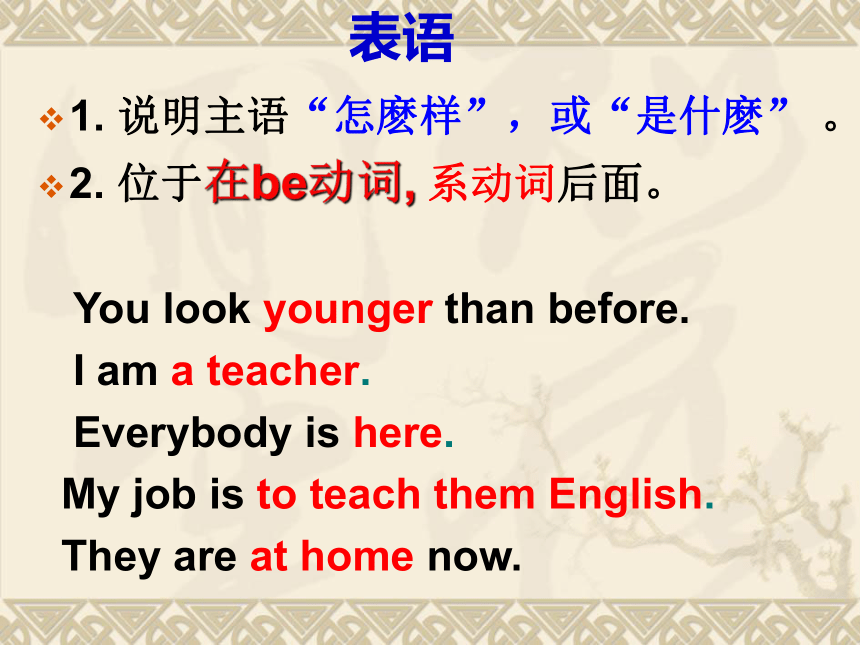
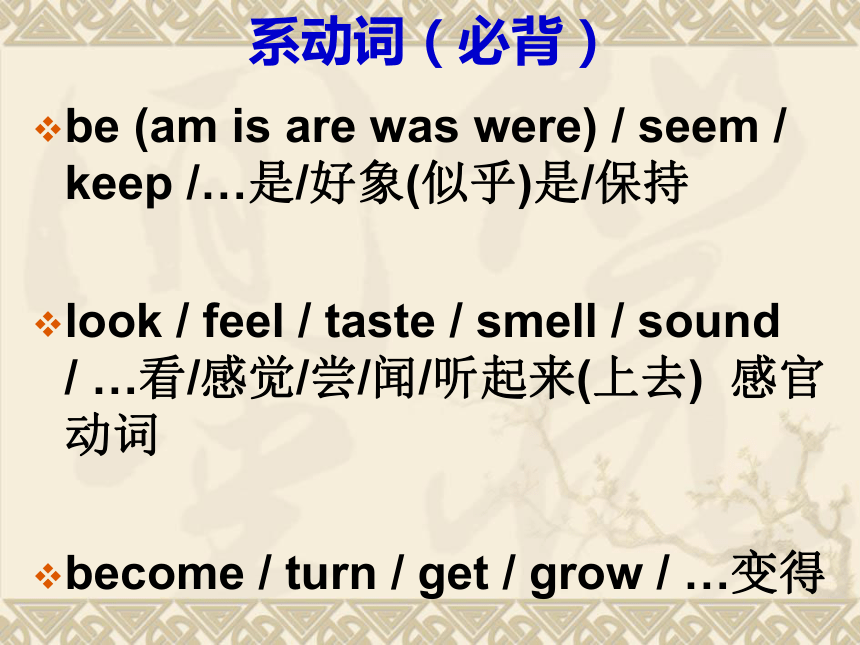
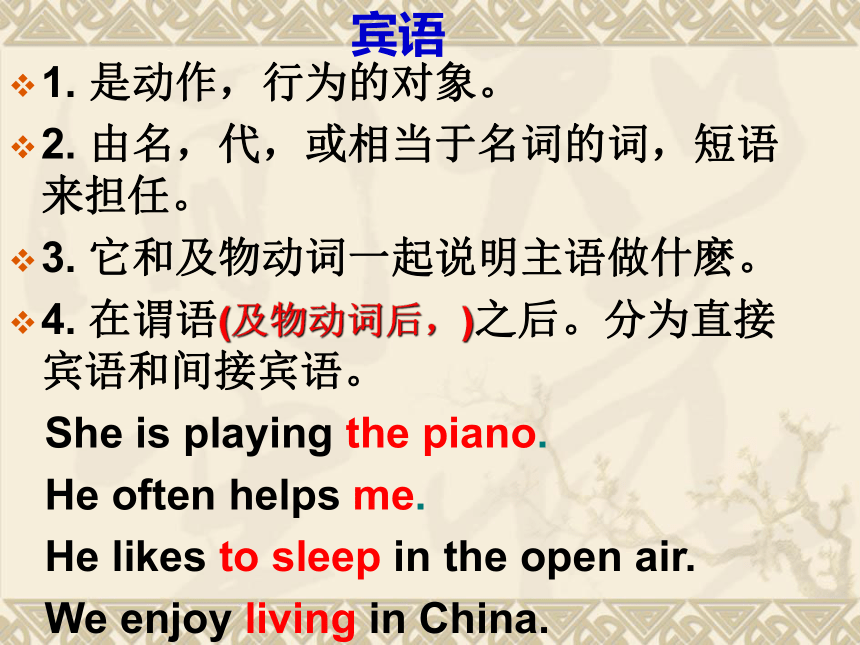
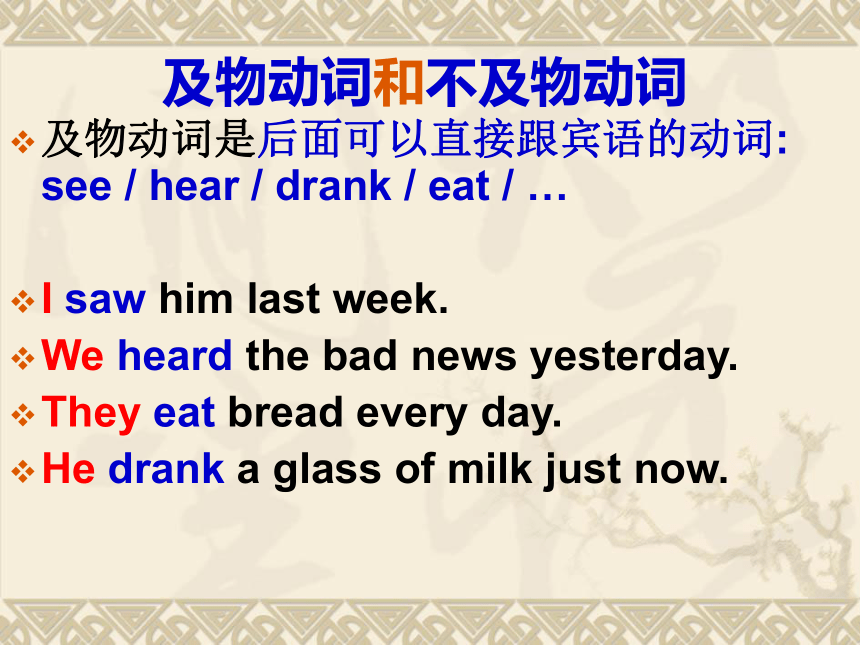
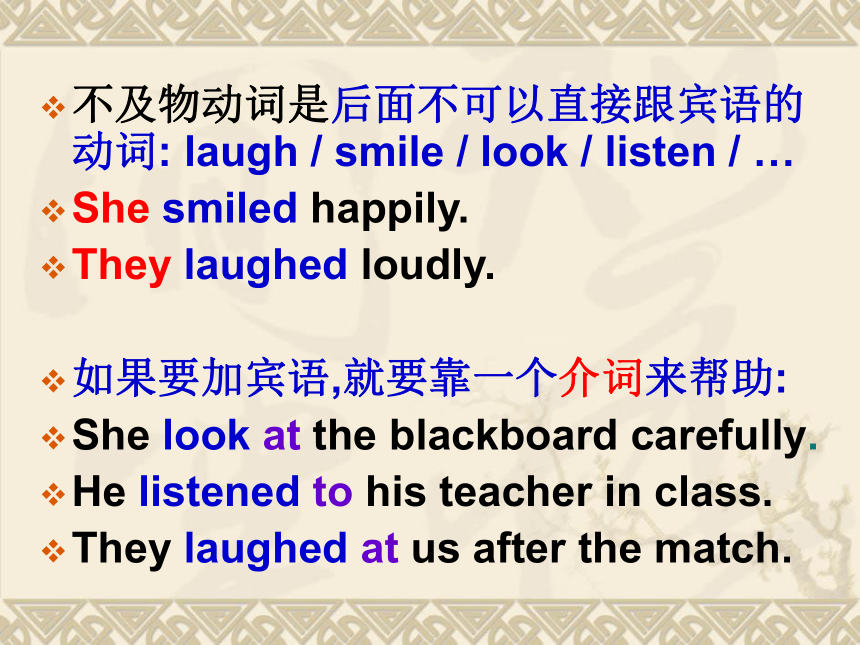
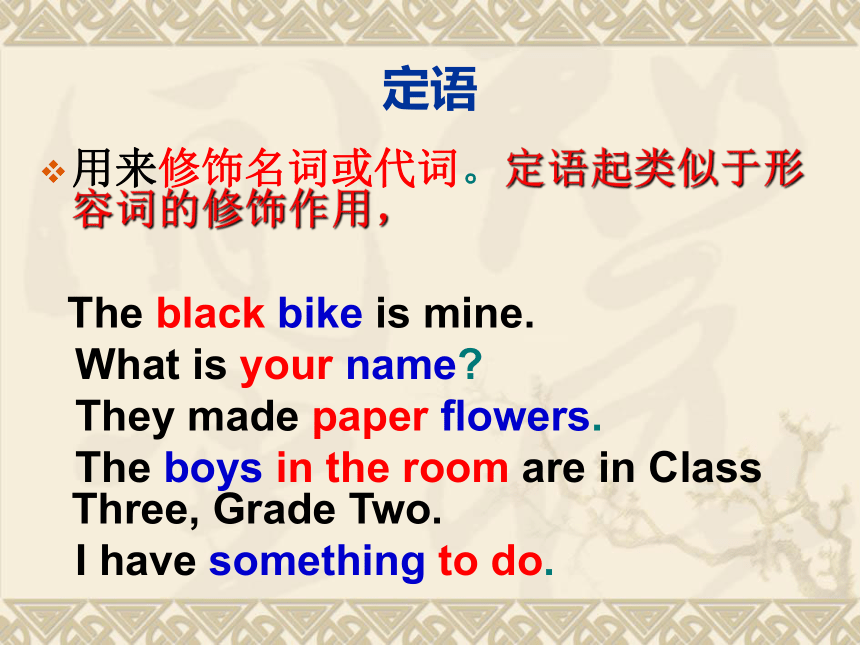
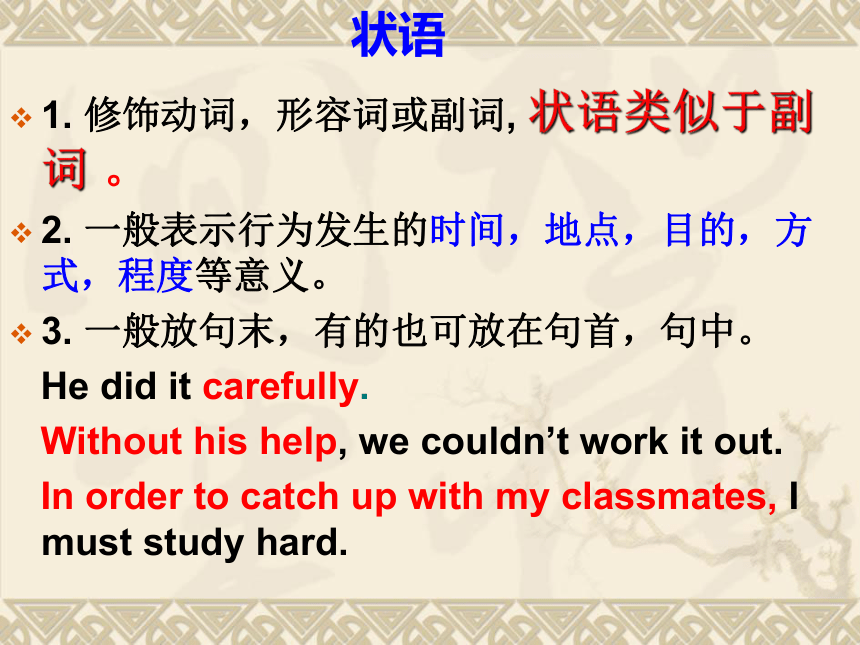
文档简介
课件59张PPT。句子成分和简单句的五种基本句型句子成分组成句子的各个部分叫做句子的成分
它包括主,谓,宾,宾补,表(直宾,间宾),定,状
主语和谓语是句子的主体部分。
表语,宾语和宾补是谓语里的组成部分。
定语和状语是句子的次要部分。
句子成分的构成句子的主干成分:主语、谓语、宾语、表语
句子的次要成分:定语、状语、补语、插入语、同位语主语1. 主语是谓语讲述的对象。
2. 表示所说的“是什麽”,“是谁”,
3. 一般由名词,代词或相当于名词的词或短语充当。
4. 它在句首。
We study in No. 7 Middle School.
The classroom is very clean.
To teach them English is my job.
Surfing, diving and swimming are all water sports.谓语1. 说明主语“做什麽”,“是什麽”,或“怎麽样”。
2. 必须用动词。
3. 和主语在人称,数两个方面必须一致(主谓一致)。
4. 在主语后面。
His parents are doctors.
She looks well.
We study hard.
We have finished reading the book.
He can speak English.表语1. 说明主语“怎麽样”,或“是什麽” 。
2. 位于在be动词, 系动词后面。
You look younger than before.
I am a teacher.
Everybody is here.
My job is to teach them English.
They are at home now.系动词(必背)be (am is are was were) / seem / keep /…是/好象(似乎)是/保持
look / feel / taste / smell / sound / …看/感觉/尝/闻/听起来(上去) 感官动词
become / turn / get / grow / …变得 宾语1. 是动作,行为的对象。
2. 由名,代,或相当于名词的词,短语来担任。
3. 它和及物动词一起说明主语做什麽。
4. 在谓语(及物动词后,)之后。分为直接宾语和间接宾语。
She is playing the piano.
He often helps me.
He likes to sleep in the open air.
We enjoy living in China.及物动词和不及物动词及物动词是后面可以直接跟宾语的动词: see / hear / drank / eat / …
I saw him last week.
We heard the bad news yesterday.
They eat bread every day.
He drank a glass of milk just now.
不及物动词是后面不可以直接跟宾语的动词: laugh / smile / look / listen / …
She smiled happily.
They laughed loudly.
如果要加宾语,就要靠一个介词来帮助:
She look at the blackboard carefully.
He listened to his teacher in class.
They laughed at us after the match.
定语用来修饰名词或代词。定语起类似于形容词的修饰作用,
The black bike is mine.
What is your name?
They made paper flowers.
The boys in the room are in Class Three, Grade Two.
I have something to do. 状语1. 修饰动词,形容词或副词, 状语类似于副词 。
2. 一般表示行为发生的时间,地点,目的,方式,程度等意义。
3. 一般放句末,有的也可放在句首,句中。
He did it carefully.
Without his help, we couldn’t work it out.
In order to catch up with my classmates, I must study hard.简单句的五种基本类型英语的句子结构简单句并列句复合句*几个简单句用分号或并列连词连接起来构成并列句;
*几个简单句可通过各种方式组合成含有主句和从句
的复合句。简单句 简单句的五种句型1)SV 主语+谓语eg. The telephone rang.
His father might have died.2) SVP 主语+谓语+表语eg. The plan sounds perfect.
Frank is an artist.3) SVO 主语+谓语+宾语eg. I saw a bird.
My sister enjoyed the play.简单句的五种句型4)SVOiOd 主语+谓语+间接宾语+直接宾语eg. The lady gave Jack a watch.
My father bought me a bicycle.5) SVOC 主语+谓语+宾语+补语eg. They called him a fool.
She found the children fast asleep.*在阅读句子的时候,第一个任务就是要找到
谓语!
*做谓语的动词有时态、语态和数的变化;还
有及物动词与不及物动词的区别。
基本句型1 S +V (主+谓)
此句型的句子有一个共同特点,即句子的谓语动词都能表达完整的意思。
这类动词叫做不及物动词,后面可以跟副词、介词短语、状语从句等。基本句型2 S +V +P (主+系+表)
此句型的句子有一个共同的特点:句子谓语动词都不能表达一个完整的意思,必须加上一个表明主语身份或状态的表语构成复合谓语,才能表达完整的意思这类动词叫做连系动词。 基本句型3 S +V +O (主+谓+宾)
此句型句子的共同特点是:谓语动词都具有实义,都是主语产生的动作,但不能表达完整的意思,必须跟有一个宾语,即动作的承受者,才能使意思完整。这类动词叫做及物动词。基本句型4 S +V +IO +O
(主+谓+间宾+直宾)此句型的句子有一个共同特点:谓语动词必须跟有两个宾语才能表达完整的意思。这两个宾语一个是动作的直接承受者,另一个是动作的间接承受者。
She lent me a book.
---She lent a book to me.
He bought me a new bike.
---He bought a new bike for me.基本句型5 S +V +O +C
(主+谓+宾+宾补)
此句型的句子的共同特点是:动词虽然是及物动词,但是只跟一个宾语还不能表达完整的意思,必须加上一个补充成分来补足宾语,才能使意思完整。主+谓+间宾+直宾 & 主+谓+宾+宾补 的比较宾语和宾补有逻辑上的主谓关系;
双宾语没有。
He made the boy laugh.
He gave me a book.
He calls me Tom.
She bought me a pen.
We sent them a telegram. 宾语和宾补双宾语宾语和宾补宾语和宾补双宾语典型例题分析1.They work hard.
主 + 谓 (状)
2.The flower is dead.
主 + 系 + 表
3.Plants need water.
主 + 谓 + 宾
4.He gives me some seeds.
主 + 谓 + 间宾+ 直宾
5.We should keep the plants in the shade.
主 + 谓 + 宾 + 宾补
6.Many animals live in trees.
主 + 谓 (状)7. We must keep our classroom clean.
主+ 谓+ 宾+ 宾补
8. After work he always feels a little tired.
(状) 主+ (状) 系+ (定) 表
9. They laughed at us after the match.
主+ 谓+ 宾 (状)
10. She told me a story.
主+ 谓+间宾+直宾
实际应用II. Choose the best answers:____ some of this juice—perhaps you’ll like it.
(’00春季 )
A. Trying B. Try
C. To try D. Having tried实际应用 I2. He sent me an e-mail, ____ to get further
information. (’00上海)
A. hoped B. hoping C. to hope D. hope实际应用I3. _____ late in the morning, Bob turned off the
alarm. (’01春招)
A. Sleep B. Sleeping
C. To sleep D. Having slept实际应用I4. _____ at the door before entering, please.
(’01春招)
A. Knocked B. To knock
C. Knocking D. Knock
实际应用I5. _____ blood if you can and many lives will be
saved. (’01上海)
A. Giving B. Give C. Given D. To give实际应用I6. The manager, ____ his factory’s products were
poor in quality, decided to give his workers
further training. (’03春招)
A. knowing B. known
C. to know D. being known 实际应用I7. It is believed that if a book is ____, it will surely
_____ the reader. (’03上海)
A. interested; interest
B. interesting; be interested
C. interested; be interesting
D. interesting; interest 实际应用I8. Suddenly, a tall man driving a golden carriage
_____ the girl and took her away, ____ into the
woods. (’04上海)
A. seizing; disappeared
B. seized; disappeared
C. seizing; disappearing
D. seized; disappearing 实际应用I9. The flowers ____ sweet in the botanic garden
attract the visitors to the beauty of nature.(’04上海)
A. to smell B. smelling
C. smell D. to be smelt实际应用I10. –English has a large vocabulary, hasn’t it?
--Yes, _____ more words and expressions and
you’ll find it easier to read and communicate.
(’04上海)
A. Know B. Knowing
C. To know D. Known 实际应用I11. Reading is an experience quite different from
watching TV; there are pictures ____ in your
mind instead of before your eyes. (’04广西)
A. to form B. form
C. forming D. having formed实际应用IIII. Correct the mistakes in the sentences. (Each
sentence has only one mistake.)My parents love me dearly of course and will
do all they can make sure that I get a good
education. (’01全国)to2. He said he was busy. That is, a game of tennis
making him very busy. (’02北京)made实际应用II3. Remembering not to shout at them. (’02北京)Remember4. It was about noon we arrived at the foot of
the mountain. (’02全国)when5. I was so tired that I felt asleep at the moment
my head touched the pillow. (’02全国)
实际应用II6. The main problem was in that I always
thought in Chinese. (’03全国)
7. One day I wrote a little story and showed to
my teacher. (’03全国)
it8. Clever as she is, but she works very hard.
(’04福建)
实际应用II9. I dream of standing on the platform in the
classroom and give lessons to lovely boys and
girls. (’04湖北)
and girls. giving lessons to lovely boys11. I know there is not easy to be a teacher. (’04湖北)it10. At weekends, we would play basket ball,
swimming in the pool or go for a picnic. (’04天津)
swim一. 利用考生思维定势,通过从句对句子进行分隔。
1. Mr. Li made up his mind to devote all he could ____ his oral English before going abroad.
A. improve B. to improve C. improving D. to improving
2. The letter I was looking forward to ____ at last.
A. arrived B. arrive C. arriving D. have arrivedDA二. 将句子变为疑问句或感叹句,造成句子中动宾关系的分隔。
3. Whom do you want to have ____ the parts of the car together?
A. fix B. to fix C. fixing D. fixed
4. What have I said ____ you angry?
A. made B. make C. to make D. making
5. You can never imagine what great difficulty I have ____ your house.
A. found B. finding C. to find D. for findingACB三. 相似结构混在一起,形成对句子的分隔。
6. It was in the house ____ he used to live that the exhibition was held.
A. where B. that C. which D. there四. 在主谓之间加入介词短语。
7. I think Tom, together with you, ____.
A. be blamed B. is to blame C. are to be blamed D. are to blameAB五. 固定搭配被其它词隔开。
8. We waited ____ line for the bus.
A. for B. in C. on D. withB六. 添上插入语。
9. He has written another scientific report, ____ of great importance to science.
A. which I think it is B. which I think is C. I think it is D. I think which is
10. –We haven’t heard from Jane for a long time. –What do you suppose ____ to her?
A. was happening B. to happen C. has happened D. having happenedBC七.同位语从句的中心名词与从句被其它成分分隔。
11. The secret spread out very quickly in the town ____ he will be headmaster of our school.
A. where B. in that C. that D. which 八. 用倒装句引起分隔现象。
12. He found on the table next to the armchair ____ two pipes, some tobacco and a box of matches.
A. was B. is C. are D. wereCD九. 复合谓语被分隔。复合谓语被分隔指谓语部分的助动词、系动词或情态动词与主要动词被分隔的现象。例如:
13. An awful accident _____, however, occur the other day.
A. does B. did C. has to D. had toB巩固练习:
1. Bruce spent as much time as he ____ over his lessons.
A. could go B. could going C. could to go D. went
2. A book, as well as a pen and a magazine, ____ been left in the reading room.
A. have B. are C. has D. isBC3. –Who did the manager ____ the work? --Maybe ____ of the two men.
A. have do; the taller B. have done; the older
C. have to do; the younger D. let do; taller
4. Mrs. Brown was much disappointed to see washing machine she had had ____ went wrong again.
A. it B. it repaired C. repaired D. to be repairedAC5. –Thank you for the great trouble you’ve had ____ me with my computer work.
--That’s nothing.
A. with helping B. helping C. to help D. to have helped
6. –Thank you for the great trouble you’ve taken ____ me with my computer work.
--That’s nothing.
A. with helping B. helping C. to help D. to have helpedBC7. The professor we referred ____ yesterday.
A. to came B. to coming C. came D. coming
8. Word came in the afternoon ____ there would be an English exam.
A. when B. that C. which D. every time
9. Who would you rather ____ with you to the park, John or Mary?
A. to go B. have gone C. have go D. goingABC10. Information has been put forward ____ more middle school graduates will be admitted into universities.
A. while B. that C. when D. as
11. The remaining time should be made full use ____ well prepared for the college entrance examination.
A. of getting B. of to get C. to get D. in gettingBBPractice makes perfect!再 见!
它包括主,谓,宾,宾补,表(直宾,间宾),定,状
主语和谓语是句子的主体部分。
表语,宾语和宾补是谓语里的组成部分。
定语和状语是句子的次要部分。
句子成分的构成句子的主干成分:主语、谓语、宾语、表语
句子的次要成分:定语、状语、补语、插入语、同位语主语1. 主语是谓语讲述的对象。
2. 表示所说的“是什麽”,“是谁”,
3. 一般由名词,代词或相当于名词的词或短语充当。
4. 它在句首。
We study in No. 7 Middle School.
The classroom is very clean.
To teach them English is my job.
Surfing, diving and swimming are all water sports.谓语1. 说明主语“做什麽”,“是什麽”,或“怎麽样”。
2. 必须用动词。
3. 和主语在人称,数两个方面必须一致(主谓一致)。
4. 在主语后面。
His parents are doctors.
She looks well.
We study hard.
We have finished reading the book.
He can speak English.表语1. 说明主语“怎麽样”,或“是什麽” 。
2. 位于在be动词, 系动词后面。
You look younger than before.
I am a teacher.
Everybody is here.
My job is to teach them English.
They are at home now.系动词(必背)be (am is are was were) / seem / keep /…是/好象(似乎)是/保持
look / feel / taste / smell / sound / …看/感觉/尝/闻/听起来(上去) 感官动词
become / turn / get / grow / …变得 宾语1. 是动作,行为的对象。
2. 由名,代,或相当于名词的词,短语来担任。
3. 它和及物动词一起说明主语做什麽。
4. 在谓语(及物动词后,)之后。分为直接宾语和间接宾语。
She is playing the piano.
He often helps me.
He likes to sleep in the open air.
We enjoy living in China.及物动词和不及物动词及物动词是后面可以直接跟宾语的动词: see / hear / drank / eat / …
I saw him last week.
We heard the bad news yesterday.
They eat bread every day.
He drank a glass of milk just now.
不及物动词是后面不可以直接跟宾语的动词: laugh / smile / look / listen / …
She smiled happily.
They laughed loudly.
如果要加宾语,就要靠一个介词来帮助:
She look at the blackboard carefully.
He listened to his teacher in class.
They laughed at us after the match.
定语用来修饰名词或代词。定语起类似于形容词的修饰作用,
The black bike is mine.
What is your name?
They made paper flowers.
The boys in the room are in Class Three, Grade Two.
I have something to do. 状语1. 修饰动词,形容词或副词, 状语类似于副词 。
2. 一般表示行为发生的时间,地点,目的,方式,程度等意义。
3. 一般放句末,有的也可放在句首,句中。
He did it carefully.
Without his help, we couldn’t work it out.
In order to catch up with my classmates, I must study hard.简单句的五种基本类型英语的句子结构简单句并列句复合句*几个简单句用分号或并列连词连接起来构成并列句;
*几个简单句可通过各种方式组合成含有主句和从句
的复合句。简单句 简单句的五种句型1)SV 主语+谓语eg. The telephone rang.
His father might have died.2) SVP 主语+谓语+表语eg. The plan sounds perfect.
Frank is an artist.3) SVO 主语+谓语+宾语eg. I saw a bird.
My sister enjoyed the play.简单句的五种句型4)SVOiOd 主语+谓语+间接宾语+直接宾语eg. The lady gave Jack a watch.
My father bought me a bicycle.5) SVOC 主语+谓语+宾语+补语eg. They called him a fool.
She found the children fast asleep.*在阅读句子的时候,第一个任务就是要找到
谓语!
*做谓语的动词有时态、语态和数的变化;还
有及物动词与不及物动词的区别。
基本句型1 S +V (主+谓)
此句型的句子有一个共同特点,即句子的谓语动词都能表达完整的意思。
这类动词叫做不及物动词,后面可以跟副词、介词短语、状语从句等。基本句型2 S +V +P (主+系+表)
此句型的句子有一个共同的特点:句子谓语动词都不能表达一个完整的意思,必须加上一个表明主语身份或状态的表语构成复合谓语,才能表达完整的意思这类动词叫做连系动词。 基本句型3 S +V +O (主+谓+宾)
此句型句子的共同特点是:谓语动词都具有实义,都是主语产生的动作,但不能表达完整的意思,必须跟有一个宾语,即动作的承受者,才能使意思完整。这类动词叫做及物动词。基本句型4 S +V +IO +O
(主+谓+间宾+直宾)此句型的句子有一个共同特点:谓语动词必须跟有两个宾语才能表达完整的意思。这两个宾语一个是动作的直接承受者,另一个是动作的间接承受者。
She lent me a book.
---She lent a book to me.
He bought me a new bike.
---He bought a new bike for me.基本句型5 S +V +O +C
(主+谓+宾+宾补)
此句型的句子的共同特点是:动词虽然是及物动词,但是只跟一个宾语还不能表达完整的意思,必须加上一个补充成分来补足宾语,才能使意思完整。主+谓+间宾+直宾 & 主+谓+宾+宾补 的比较宾语和宾补有逻辑上的主谓关系;
双宾语没有。
He made the boy laugh.
He gave me a book.
He calls me Tom.
She bought me a pen.
We sent them a telegram. 宾语和宾补双宾语宾语和宾补宾语和宾补双宾语典型例题分析1.They work hard.
主 + 谓 (状)
2.The flower is dead.
主 + 系 + 表
3.Plants need water.
主 + 谓 + 宾
4.He gives me some seeds.
主 + 谓 + 间宾+ 直宾
5.We should keep the plants in the shade.
主 + 谓 + 宾 + 宾补
6.Many animals live in trees.
主 + 谓 (状)7. We must keep our classroom clean.
主+ 谓+ 宾+ 宾补
8. After work he always feels a little tired.
(状) 主+ (状) 系+ (定) 表
9. They laughed at us after the match.
主+ 谓+ 宾 (状)
10. She told me a story.
主+ 谓+间宾+直宾
实际应用II. Choose the best answers:____ some of this juice—perhaps you’ll like it.
(’00春季 )
A. Trying B. Try
C. To try D. Having tried实际应用 I2. He sent me an e-mail, ____ to get further
information. (’00上海)
A. hoped B. hoping C. to hope D. hope实际应用I3. _____ late in the morning, Bob turned off the
alarm. (’01春招)
A. Sleep B. Sleeping
C. To sleep D. Having slept实际应用I4. _____ at the door before entering, please.
(’01春招)
A. Knocked B. To knock
C. Knocking D. Knock
实际应用I5. _____ blood if you can and many lives will be
saved. (’01上海)
A. Giving B. Give C. Given D. To give实际应用I6. The manager, ____ his factory’s products were
poor in quality, decided to give his workers
further training. (’03春招)
A. knowing B. known
C. to know D. being known 实际应用I7. It is believed that if a book is ____, it will surely
_____ the reader. (’03上海)
A. interested; interest
B. interesting; be interested
C. interested; be interesting
D. interesting; interest 实际应用I8. Suddenly, a tall man driving a golden carriage
_____ the girl and took her away, ____ into the
woods. (’04上海)
A. seizing; disappeared
B. seized; disappeared
C. seizing; disappearing
D. seized; disappearing 实际应用I9. The flowers ____ sweet in the botanic garden
attract the visitors to the beauty of nature.(’04上海)
A. to smell B. smelling
C. smell D. to be smelt实际应用I10. –English has a large vocabulary, hasn’t it?
--Yes, _____ more words and expressions and
you’ll find it easier to read and communicate.
(’04上海)
A. Know B. Knowing
C. To know D. Known 实际应用I11. Reading is an experience quite different from
watching TV; there are pictures ____ in your
mind instead of before your eyes. (’04广西)
A. to form B. form
C. forming D. having formed实际应用IIII. Correct the mistakes in the sentences. (Each
sentence has only one mistake.)My parents love me dearly of course and will
do all they can make sure that I get a good
education. (’01全国)to2. He said he was busy. That is, a game of tennis
making him very busy. (’02北京)made实际应用II3. Remembering not to shout at them. (’02北京)Remember4. It was about noon we arrived at the foot of
the mountain. (’02全国)when5. I was so tired that I felt asleep at the moment
my head touched the pillow. (’02全国)
实际应用II6. The main problem was in that I always
thought in Chinese. (’03全国)
7. One day I wrote a little story and showed to
my teacher. (’03全国)
it8. Clever as she is, but she works very hard.
(’04福建)
实际应用II9. I dream of standing on the platform in the
classroom and give lessons to lovely boys and
girls. (’04湖北)
and girls. giving lessons to lovely boys11. I know there is not easy to be a teacher. (’04湖北)it10. At weekends, we would play basket ball,
swimming in the pool or go for a picnic. (’04天津)
swim一. 利用考生思维定势,通过从句对句子进行分隔。
1. Mr. Li made up his mind to devote all he could ____ his oral English before going abroad.
A. improve B. to improve C. improving D. to improving
2. The letter I was looking forward to ____ at last.
A. arrived B. arrive C. arriving D. have arrivedDA二. 将句子变为疑问句或感叹句,造成句子中动宾关系的分隔。
3. Whom do you want to have ____ the parts of the car together?
A. fix B. to fix C. fixing D. fixed
4. What have I said ____ you angry?
A. made B. make C. to make D. making
5. You can never imagine what great difficulty I have ____ your house.
A. found B. finding C. to find D. for findingACB三. 相似结构混在一起,形成对句子的分隔。
6. It was in the house ____ he used to live that the exhibition was held.
A. where B. that C. which D. there四. 在主谓之间加入介词短语。
7. I think Tom, together with you, ____.
A. be blamed B. is to blame C. are to be blamed D. are to blameAB五. 固定搭配被其它词隔开。
8. We waited ____ line for the bus.
A. for B. in C. on D. withB六. 添上插入语。
9. He has written another scientific report, ____ of great importance to science.
A. which I think it is B. which I think is C. I think it is D. I think which is
10. –We haven’t heard from Jane for a long time. –What do you suppose ____ to her?
A. was happening B. to happen C. has happened D. having happenedBC七.同位语从句的中心名词与从句被其它成分分隔。
11. The secret spread out very quickly in the town ____ he will be headmaster of our school.
A. where B. in that C. that D. which 八. 用倒装句引起分隔现象。
12. He found on the table next to the armchair ____ two pipes, some tobacco and a box of matches.
A. was B. is C. are D. wereCD九. 复合谓语被分隔。复合谓语被分隔指谓语部分的助动词、系动词或情态动词与主要动词被分隔的现象。例如:
13. An awful accident _____, however, occur the other day.
A. does B. did C. has to D. had toB巩固练习:
1. Bruce spent as much time as he ____ over his lessons.
A. could go B. could going C. could to go D. went
2. A book, as well as a pen and a magazine, ____ been left in the reading room.
A. have B. are C. has D. isBC3. –Who did the manager ____ the work? --Maybe ____ of the two men.
A. have do; the taller B. have done; the older
C. have to do; the younger D. let do; taller
4. Mrs. Brown was much disappointed to see washing machine she had had ____ went wrong again.
A. it B. it repaired C. repaired D. to be repairedAC5. –Thank you for the great trouble you’ve had ____ me with my computer work.
--That’s nothing.
A. with helping B. helping C. to help D. to have helped
6. –Thank you for the great trouble you’ve taken ____ me with my computer work.
--That’s nothing.
A. with helping B. helping C. to help D. to have helpedBC7. The professor we referred ____ yesterday.
A. to came B. to coming C. came D. coming
8. Word came in the afternoon ____ there would be an English exam.
A. when B. that C. which D. every time
9. Who would you rather ____ with you to the park, John or Mary?
A. to go B. have gone C. have go D. goingABC10. Information has been put forward ____ more middle school graduates will be admitted into universities.
A. while B. that C. when D. as
11. The remaining time should be made full use ____ well prepared for the college entrance examination.
A. of getting B. of to get C. to get D. in gettingBBPractice makes perfect!再 见!
同课章节目录
- 词法
- 名词
- 动词和动词短语
- 动词语态
- 动词时态
- 助动词和情态动词
- 非谓语动词
- 冠词
- 代词
- 数词和量词
- 形容词副词及其比较等级
- 介词和介词短语
- 连词和感叹词
- 构词法
- 相似、相近词比较
- 句法
- 陈述句
- 一般疑问句和否定疑问句
- 特殊疑问句及选择疑问句
- 反意疑问句
- 存在句(There be句型)
- 宾语从句
- 定语从句
- 状语从句
- 主谓一致问题
- 简单句
- 并列句
- 复合句
- 主谓一致
- 主、表语从句
- 名词性从句
- 直接引语和间接引语
- 虚拟语气
- 感叹句
- 强调句
- 倒装句
- 祈使句
- 句子的成分
- 句子的分类
- 题型专区
- 单项选择部分
- 易错题
- 完形填空
- 阅读理解
- 词汇练习
- 听说训练
- 句型转换
- 补全对话
- 短文改错
- 翻译
- 书面表达
- 任务型阅读
- 语法填空
- 其他资料
